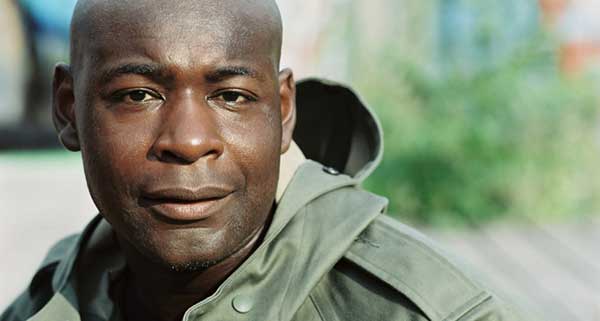| A Guy Called Gerald: True school | |
| InTheMix 31st October 2011 Link |
|
 “I just need a good soundsystem and I’m there,” A Guy Called Gerald tells inthemix, and it’s a mantra he’s been living for over 20 years now. The story began in Manchester in the late ‘80s, when Gerald Simpson made acid house history as one of the founders of 808 State and of course with the creation of Voodoo Ray. Since those early days, there has never been a dry spell for the producer, with releases in recent years on Perlon, Beatstreet and Laboratory Instinct. In 2011, Simpson has delivered three digital-only releases, Manerva, Umgaia and Driver [listen below] on his own imprint. “I think me and a lot of people who produce their own music feel this is the best way,” he says. “This is something that I feel has developed over the last two decades.” In his ‘live jam sessions’, Simpson continues to explore the possibilities of Reason software, and very soon he’ll be back in Australia to flex his “raw, unhinged sound library”. What’s more, he’ll be doing it in the great outdoors at Shine On Festival in Victoria and Subsonic Music Festival in New South Wales. We spoke briefly to one of dance music’s certified originals about keeping it true school. In an interview I read from earlier this year, you said you rarely DJ these days because “it’s hard to find the tunes”. Do you feel there’s a lack of inspiration around in newer records? There is a lack of inspiration. I feel that the music a lot of people hear does not move them in any way but they feel they can do better. But most have nothing from the ‘true school’ to guide them. Some have just never experienced music by people who were brave enough to do something different. I feel the real pioneers so far in this century have been the software developers – the real inventors in music production. Can you tell us a bit about the ‘True School’ sets you played earlier this year? I noticed a few younger people seem a little perplexed about where modern dance music has its foundations and I don’t think there are many people from my era representing this music. If they are, then usually people go for what is hip. ‘True School’ was everything that came before the underground was engulfed by the mainstream music business. You’ve collaborated with the likes of System 7 and Tom Clark/Benno Blome in recent years. Is it always inspiring to have those kinds of exchanges with other producers, seeing how they work? Yes, it’s very interesting to see how other people work. I guess most people nowadays have a structure and a body of people that came before them that make the same type of music so I guess there are certain types of mental restrictions. I feel they have a need to be “of the times”. With the likes of Pacific State and Voodoo Ray, are they still compositions you enjoy bringing out in your club sets? Do you find new ways to keep them fresh for you? It’s the most boring thing on the planet regurgitating 20 year old sequencers that were done on a two-bit drum machine when you’ve got almost unlimited technology now. I do perform them but not as they were originally frozen. Now they are free and liquid digital and I can take them anywhere. I don’t see the point in performing the recordings – they can download that and owned so it’s my duty to make something unique when you come out to hear me. So what’s the plan for your Australian tour? Is there anything you’re working on in the lead-up to coming here? The plan is to perform for as long as possible and, depending on how receptive the dancefloor is, experiment on the crowd. On average I’ve got about 20-30 hours of my own raw, unhinged sound library to experiment and jam with. I noticed most people have a pre-determined set which leaves no space. I can’t work this way – never have. I’m looking forward to it. I just need a good soundsystem and I’m there. We’re loving the ‘80s hip hop mixtape you posted on your Soundcloud [listen below]. What inspired you to put that together? These were the tracks that made me want to buy my first drum machine. I actually had a visual version of how these tracks were put together before I had my first synth. These tunes are a blueprint of electronic dance music today. When they came out the 303 and the SH101 and the 808 were brand new and a lot of the ‘professional’ musicians were shunning these instruments in exactly the same way it’s hip to play vinyl now instead of digital. It’s funny to see these patterns repeating themselves. [Author: Jack Tregoning] |
|